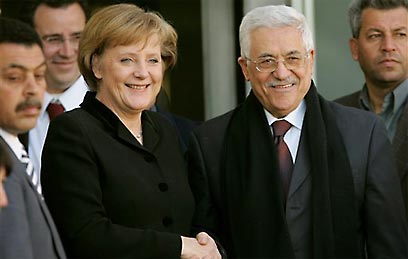Foreign Minister Gabi Ashkenazi on Wednesday told his German counterpart Heiko Maas that Berlin should wait until Israel takes concrete steps on annexing parts of the West Bank before making any response.
Maas made his first trip outside of Europe since the outbreak of the coronavirus pandemic to convey Europe's stiff opposition to Israeli plans to begin annexing parts of the West Bank on July 1, in line with the U.S. Middle East peace plan.
5 View gallery


Foreign Minister Gabi Ashkenazi, right, meets with his German counterpart Heiko Maas in Jerusalem on Wednesday
(Photo: Amit Shabi)
Ashkenazi said after the meeting that he "hopes that Germany will first wait for an Israeli decision before taking any steps against Israel, if at all."
He stressed that Germany is a friend of Israel, noting that "the plan will be implemented responsibly, while maintaining regional stability."
The annexation plan has come under harsh criticism from some of Israel's closest allies, including Germany, who say that unilaterally redrawing the regional map would destroy any lingering hopes for establishing a Palestinian state and reaching a two-state peace agreement.
"Many people in Israel - and also in the European Union - are preoccupied with the current developments in the Middle East peace process and the possible annexation plans," Maas said prior to his departure.
"Germany remains committed to the goal of a negotiated two-state solution. We will also talk about this and I will underline that we are ready to support all initiatives to revive talks between Israelis and Palestinians."
Germany, already a key European power broker, will be taking over the rotating presidency of the Council of the European Union and assuming the presidency of the United Nations Security Council next month.
Maas was also scheduled to consult with Prime Minister Benjamin Netanyahu and Defense Minister Benny Gantz.
Later in the day, he was to travel to neighboring Jordan to meet his counterpart there and hold a conference call with Palestinian leaders.
The Israeli media reported this week that the government scuppered Maas' plan to meet with the Palestinian leadership by warning that he would have to enter two-week quarantine upon his return to Israel from the West Bank.
5 View gallery


German Chancellor Angela Merkel meeting with Palestinian President Mahmoud Abbas
(Photo: Archive)
The U.S. plan envisions leaving about one-third of the West Bank, which Israel captured in the 1967 Six-Day War, under permanent Israeli control, while granting the Palestinians expanded autonomy in the remainder of the territory.
The Palestinians, who seek all of the West Bank as part of an independent state, have rejected the plan, saying it overwhelmingly favors Israel.
In response, they have cut off key security ties with Israel and say they are no longer bound to agreements signed. The moves have raised concerns of a return to violence if annexation is carried out.
Gantz has urged the military to hasten preparations for what could be fierce Palestinian protests against the move.
5 View gallery


Yesha Council campaign against U.S. peace plan's provision for a future Palestinian state
(Photo: Courtesy of Yesha Council)
The proposal also faces opposition in Israel, where many fear that annexation is a step that could lead to the creation of a single bi-national state with the Palestinians. Even some hard-line settlers oppose the plan, saying it doesn't go far enough.
But Netanyahu appears eager to press forth before the U.S. election in November, when Joe Biden, the presumptive Democratic nominee who has said he opposes annexation, could replace Trump.
Netanyahu has lauded Trump's nearly blanket support for his policies and hailed annexation as a historic opportunity to establish Israel's permanent borders, and retain control of strategic frontiers without having to evacuate a single settler.
Previous peace plans have all included calls for far greater Israeli concessions.
First published: 14:05, 06.10.20



